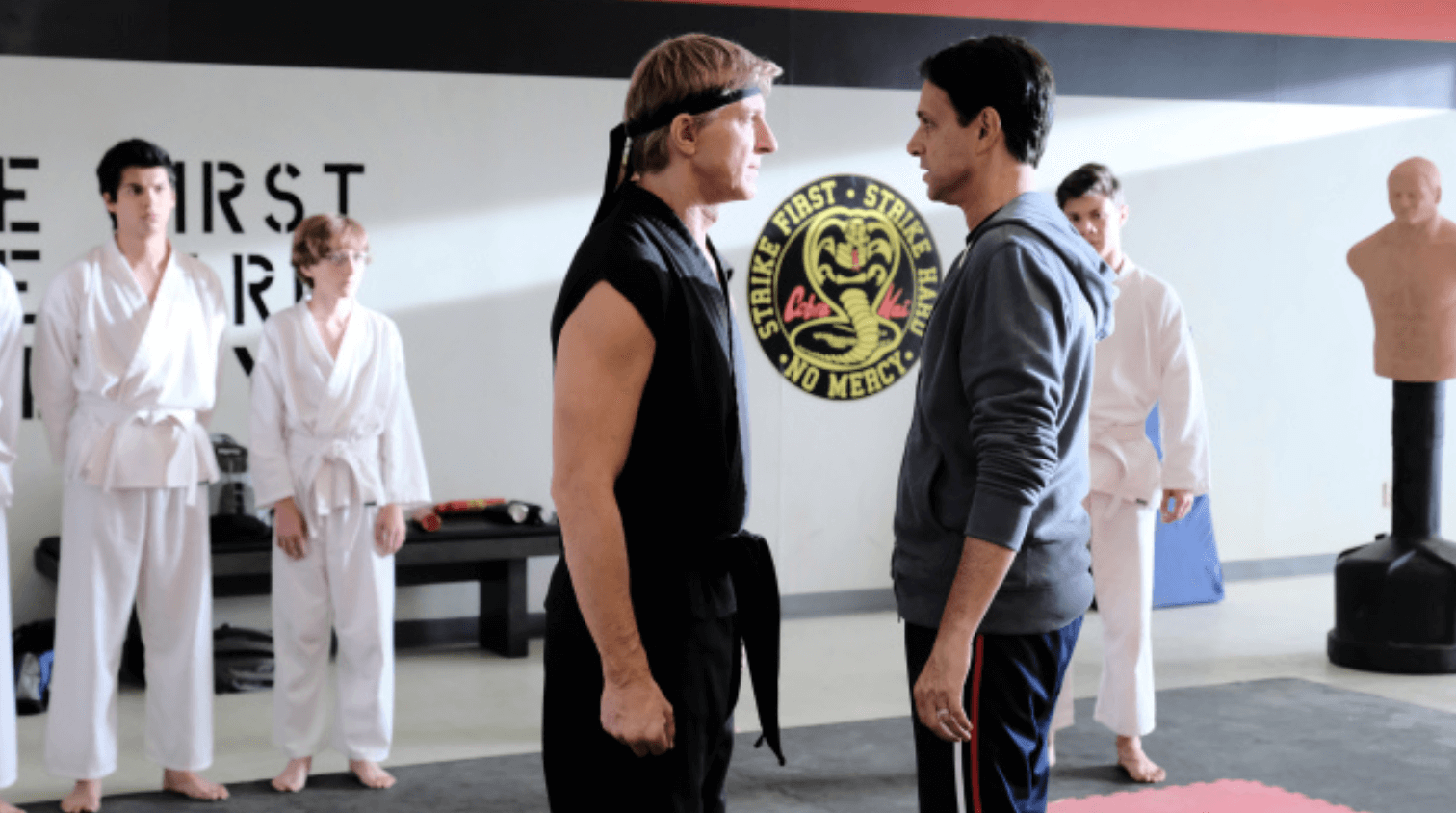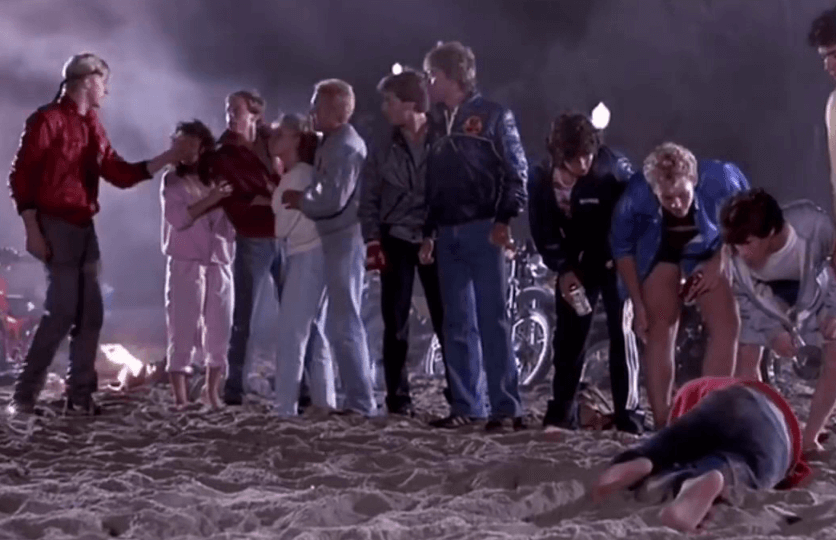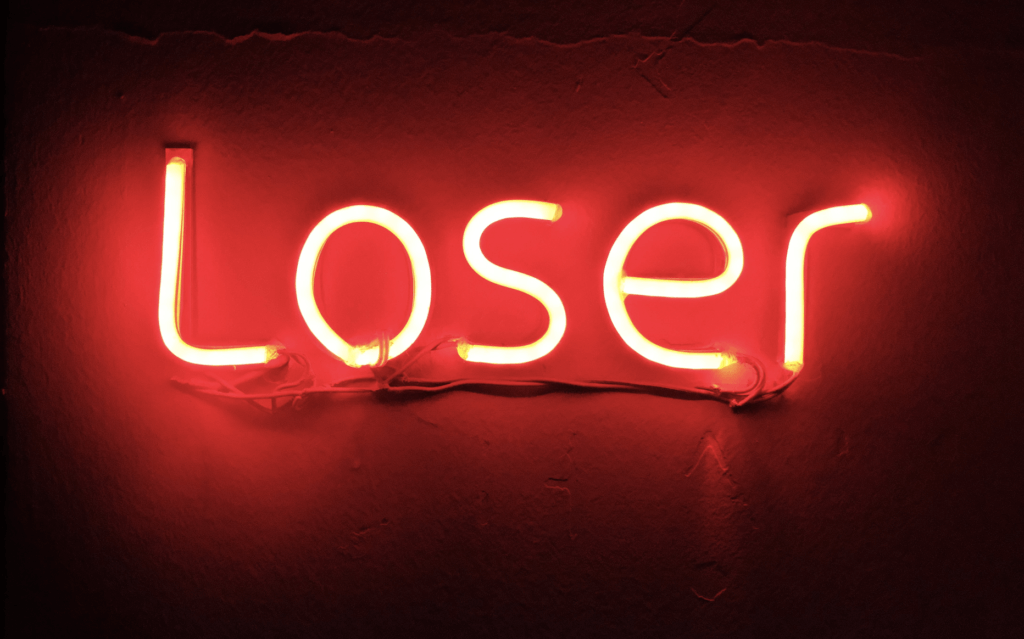These are the facts, and they are undisputed: Cobra Kai is my current favorite show on Netflix (considering WandaVision is on rival Disney Plus).
And yeah, I was late to the party, considering Netflix picked up the series in June 2020, but once I started watching, I was hooked.
If you haven’t watched it, here’s the premise. It’s about 30 years after the events of The Karate Kid. Daniel LaRusso (Ralph Macchio) owns a successful luxury car dealership in the San Fernando Valley. He has a smart, beautiful wife, two kids, a fancy house with a pool, and a country club membership. As Dean Martin sings in the intro to episode 2, “how lucky can one guy be?”
Things haven’t gone so well for Danny’s high school rival, Johnny Lawrence (William Zabka). He and his ex don’t get along, his teenage son wants nothing to do with him, and he just lost his handyman job after calling a customer “bitchy.” He seems to spend most of his time drinking Coors Banquet and scoping chicks from his ratty Pontiac Firebird.
Blasting Poison’s “Nothin’ But a Good Time,” natch.
But then everything changes when Miguel (Xolo Maridueña), Johnny’s teenage neighbor who lives with his single mom and grandma, gets assaulted by the cool kids and wants to learn karate. The Cobra Kai dojo is reborn in a Reseda strip mall, to Daniel LaRusso’s dismay.
And the rest of Season 1 practically writes itself. I loved every episode.
I mean, Cobra Kai isn’t deep like The Sopranos, or Friends, but it can be surprisingly moving. And if nothing else, it has some great lessons for lawyers.
That’s because it’s really a show about perspective. Naturally, the original movie told the story from Danny’s perspective. Cobra Kai flips the script and starts from Johnny’s perspective—waking up with a hangover in his crappy apartment.
I came in expecting Johnny Lawrence would be the hero, or at least the anti-hero, while LaRusso would turn out to be the villain. And in the first few episodes, you’re definitely pulling for Johnny, despite his obvious flaws, while it seems Daniel-san has become rich, pretentious, and a little vindictive. But as the season progresses, you see more of the redeeming qualities that made Danny likeable in the movie.
What emerges is a series that deftly shows how much conflict can develop between people who sincerely think they are doing the right thing, from their own point of view.
In the words of Ben Kenobi, the Mr. Miyagi of Star Wars, “you will find that many of the truths we cling to depend greatly on our point of view.”
This becomes clear early on in Cobra Kai, when we learn Johnny’s back story. Would you believe he didn’t become a bully out of nowhere? No, while Johnny did grow up in an upscale neighborhood, turns out he had an emotionally abusive stepfather who bullied him every day. So even if we don’t approve of Johnny beating up Danny in high school, at least we understand.
And when we hear the story from Johnny’s point of view, we even start to wonder if we had it all wrong. Some new kid from out of town moves in on your girl, sprays you with a hose at the high school dance, and swipes your All Valley karate title with an illegal kick. Are you supposed to just sit there and take it?
More about that later.
Whatever we think of adolescent Johnny, present-day Johnny is at least trying to do something right. He asks his ex if his son Robbie (Tanner Buchanan) can come live with him. He becomes a father figure to Miguel; they celebrate with a big bear hug after Miguel’s first successful date (with Danny’s daughter, of course). Johnny ridicules his students to their faces, but only so they’ll toughen up and learn to stand up for themselves.
Danny, on the other hand, is not having it, and we can understand why. He wasn’t some rich kid like Johnny; he had to earn success the hard way. Plus, he knows Johnny’s sensei was John Kreese, a coldblooded sociopath. Kreese is now dead, but surely the apple doesn’t fall too far from the tree, Danny thinks.

So, even as we’re pulling for Johnny to get more students at his struggling dojo, we also sympathize with Danny trying to protect the kids of his community from a bad influence.
And that, for me, was the biggest lesson of season 1. You see two protagonists in direct conflict with each other, but you fully understand where each one is coming from.
This, of course, is an important skill for a lawyer, especially a trial lawyer. Granted, as a litigator you’re advocating for one side. But the ability to see the case from the opposing side’s perspective is critical.
For one thing, it’s just good strategy. Understanding the motivations of the party who is suing your client, or getting sued by your client, will help you know what to expect and plan accordingly.
But it’s not just that. I think the ability not only to understand where the other side is coming from, but to empathize with the opposing party is important. Whether you’re trying to get a witness to admit an important fact in a deposition or trying to persuade a judge that your motion for summary judgment should be granted, the ability to actually feel what that person is feeling makes a difference.
I’ll take it a step further and say the ability to empathize with everyone involved in a dispute is important. It could be the opposing lawyer, a witness, your legal assistant, a court reporter. Most of these people, most of the time, are doing what they think they are supposed to do. You won’t understand them until you understand that.
Like Atticus Finch famously said, “you never really understand a person until you consider things from his point of view . . . Until you climb inside of his skin and walk around in it.”
And yet, we must not confuse point of view with the truth, as we also learn in Cobra Kai.
Consider Johnny’s rendition of his teenage run-in with Danny. We hear this from Johnny in episode 8, while images from the original movie flash on the screen.
Here’s what Johnny says about his breakup with Ali and ensuing feud with Danny, contrasted with what we see from the flashback:
I figured we would work things out eventually, but then Daniel LaRusso came in town. [Danny arrives with his mom, not looking happy]
Next thing I know he’s hitting on her. I see the two of them flirting with each other. [Danny and Ali with a soccer ball on the beach]
I walked over to have a simple conversation with Ali. [“What is your problem?!” Johnny says to Ali, then grabs her boom box out of her hands]
But LaRusso kept butting in. [Johnny throws the boom box at Danny, knocking him to the sand]
I told him to get lost, mind your own business. Out of nowhere the guy sucker punches me. [Danny gets up and punches Johnny]
I did what any dude would do, I defended myself. [Johnny delivers three hard blows, Danny falls to the ground]
I figured that was that, but LaRusso wouldn’t leave it alone. At the Halloween dance, I’m sitting there minding my own business [Johnny rolling a joint in the bathroom stall], he douses me with a water hose.
I hadn’t seen the guy in months, and he turns a water hose on my head. So I chase him down, try to put an end to things that night, right? [Johnny and his four sidekicks corner Danny]
Turns out the guy’s got a karate master of his own. Guy comes out of nowhere, jumps us, assaults me and my friends. [Mr. Miyagi taking out the five Cobra Kais]

Sure, we can understand Johnny’s perspective on what happened, but notice what he leaves out.
The fact is that Ali had already broken up with Johnny when she met Danny at the beach.
The fact is that Johnny instigated the fight at the beach.
The fact is that Johnny and his friends were bullying the new kid from out of town.
The fact is that Mr. Miyagi was only defending Danny from five attackers.
I think the lesson here is not to take the whole “perspective” thing too far. Different people have different perspectives on the truth, but the truth is out there. The facts are the facts.
So, many years later, when Johnny shows up angry at Danny’s house after Danny’s cousin sets fire to his car, we can understand why Danny is not about to back down. He knows what really went down back in the day. So when Johnny confronts him, he puts up his dukes. It feels like two aggressive lawyers about to mix it up at a deposition.
Then something interesting happens. Danny’s wife Amanda (Courtney Henggeler) comes out of the house to see what’s going on. She could have said “you’re right, Danny, he’s a bully!” Or she could have said, “you’re wrong, Danny, you should be the one apologizing after what your cousin Louie did.”
But no. Here’s what Amanda says to her husband:
Yeah, you two seem to have this pretty well in hand. It’s a normal Saturday afternoon, a couple of grown men about to kick each other into a pool. You know, as much as I would like to watch you and your childhood karate rival duke it out, I kinda don’t want to get any blood on the patio. So what do you say we try to resolve this over some breakfast instead?
Instead of focusing on who is right about the facts, Amanda makes the guys see how silly they’re acting.
“You wanna go inside?” Danny says. “I could eat,” Johnny replies. Situation defused.
This, my friends, is emotional intelligence. Sometimes it’s not about the facts.
_________________________________

Zach Wolfe (zach@zachwolfelaw.com) is a Texas trial lawyer who handles non-compete and trade secret litigation at Zach Wolfe Law Firm. Thomson Reuters named him a Texas “Super Lawyer”® for Business Litigation in 2020, 2021, and 2022. This post is dedicated to his wife Rebecca.
These are his opinions, not the opinions of his firm or clients, so don’t cite part of this post against him in an actual case. Every case is different, so don’t rely on this post as legal advice for your case.




Leave a Comment